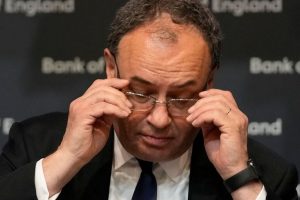‘It’s 2008 all over again’ Bank of England blasted over rate hike – ‘Completely wrong’

GMB: Martin Lewis warns of potential ‘world-wide recession’
We use your sign-up to provide content in ways you’ve consented to and to improve our understanding of you. This may include adverts from us and 3rd parties based on our understanding. You can unsubscribe at any time. More info
As the Bank’s Monetary Policy Committee (MPC) announced it was raising the base rate to the highest level in 13 years it also acknowledged the cost of living crisis could push the UK into recession later this year. Political economist Richard Murphy however believes the uK has is already entering recession, citing falling demand and both plummeting business and consumer confidence. He told Express.co.uk the Bank’s decision to raise interest rates was “completely the wrong policy”. According to Professor Murphy the UK’s inflation problem has been mainly caused by external factors such as supply chain issues and the Ukraine conflict and resulting price rises in products such as oil and gas and food.
Raising interest rates “only works when people have too much money” he explained, adding that instead the UK has the opposite with a cost of living crisis.
Prof Murphy’s views are shared by former Bank of England rate setter Danny Blanchflower who labelled the Bank as “Entirely out of touch with ordinary people”.
One of the biggest immediate impacts will be felt across mortgages with advisory firm Mazars estimating UK households will now face an overall increase of £858 million in payments.
Prof Murphy pointed out that with most mortgages on a 25 year term around half of holders will have never experienced rates this high with greater strains on budgets for those on tracker and variable rates and potential shocks for those with fixed deals coming to an end.


Combined with rising costs of other essential bills such as energy he predicted rising interest rates would “crush the ability to spend” and could lead to a household debt crisis.
Evidence has already suggested credit card borrowing is rising as households struggle to balance the books.
The situation is also of concern to businesses dealing with rising costs.
Chair of the Federation of Small Businesses Martin McTague warned: “When we spoke to members over the first lockdown, the majority were carrying debt, and four in ten were concerned that their debt was now ‘unmanageable’.”
He added: “Consider the electrician who is trying to manage surging fuel prices and the costs of supply chain disruption at work, whilst also being hit by spiralling utility bills and, now, higher mortgage repayments at home.”

Sure Thiru, Head of Economics at the British Chambers of Commerce, said: “The decision to raise interest rates will cause considerable alarm among households and businesses given the rapidly deteriorating economic outlook and mounting cost pressures many are facing.
“The Bank of England face an unenviable trade-off between soaring inflation and a wilting economy. However, higher interest rates will do little to address the global headwinds and supply constraints driving this inflationary surge.
“It also raises the risk of recession by damaging confidence and intensifying the financial squeeze on businesses and consumers.”
Notably three of the MPC’s nine members voted for a larger 50bps hike adding further weight to predictions of more interest rate hikes to come.
DON’T MISS:
Russia faces “complete isolation” with new SWIFT expulsions [INSIGHT]
Shell sees profits nearly triple [LATEST]
Tim Martin blasts “biggest threat” to hospitality [ANALYSIS]

Currently markets are pricing in increases to around 2.5 percent with consultancy Capital Economics predicting rates as high as three percent by next year.
Prof Murphy warned further rises combined with the rising cost of living could produce a “banking crisis” resembling “2008 all over again.”
He explained: “We’re going to see a banking crisis because there will be large numbers of people who will default on their mortgage payments, we will see house prices falling as a result because there will simply not be enough buyers because there won’t be people able to afford to buy.”
He concluded: “They’re going to create a massive recessionary crisis with a banking crisis tagged on.”
Source: Read Full Article
